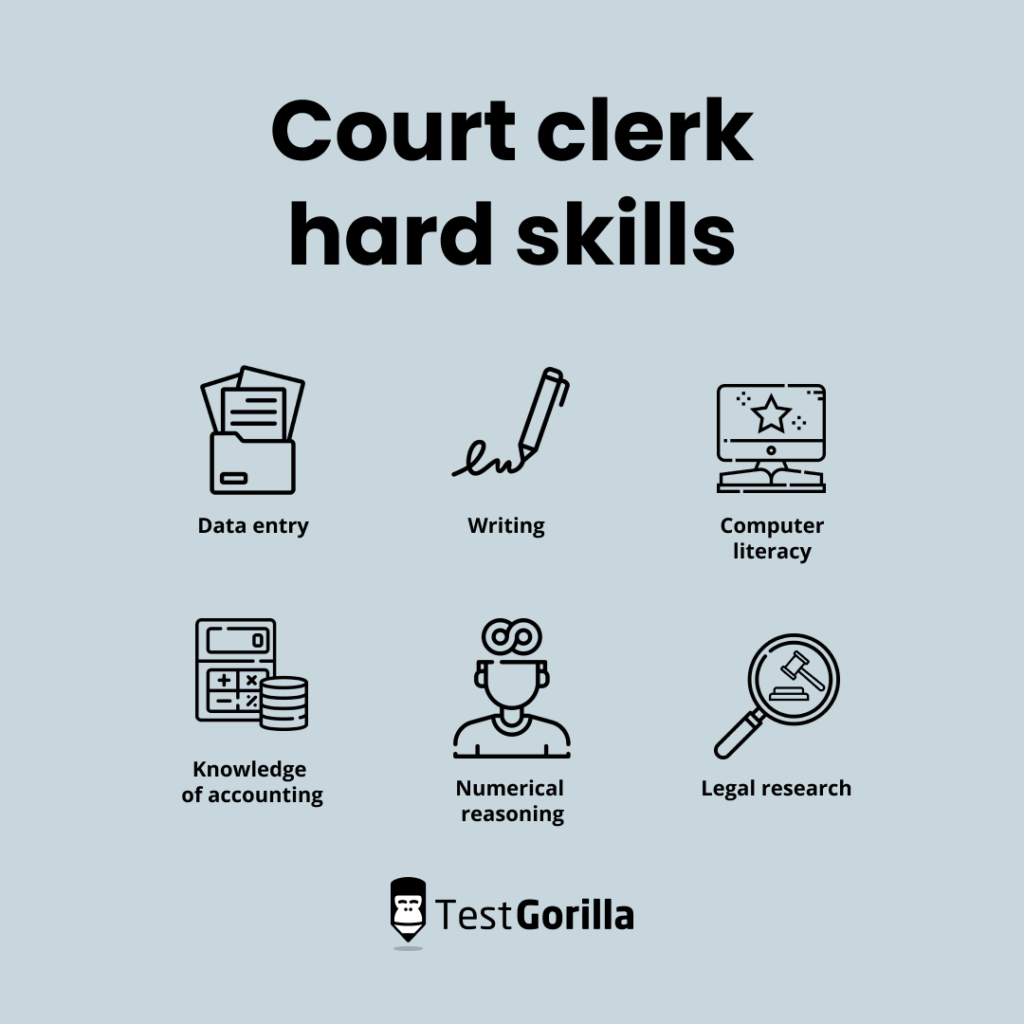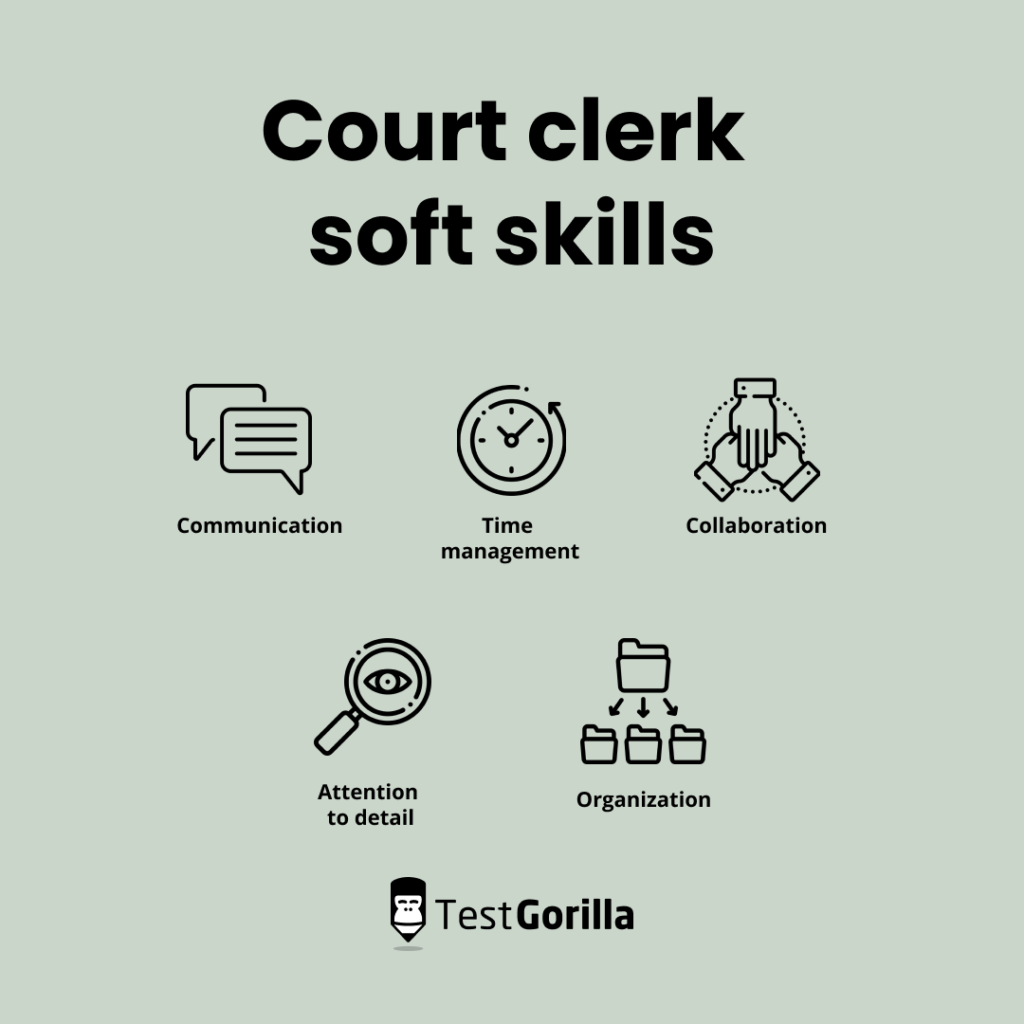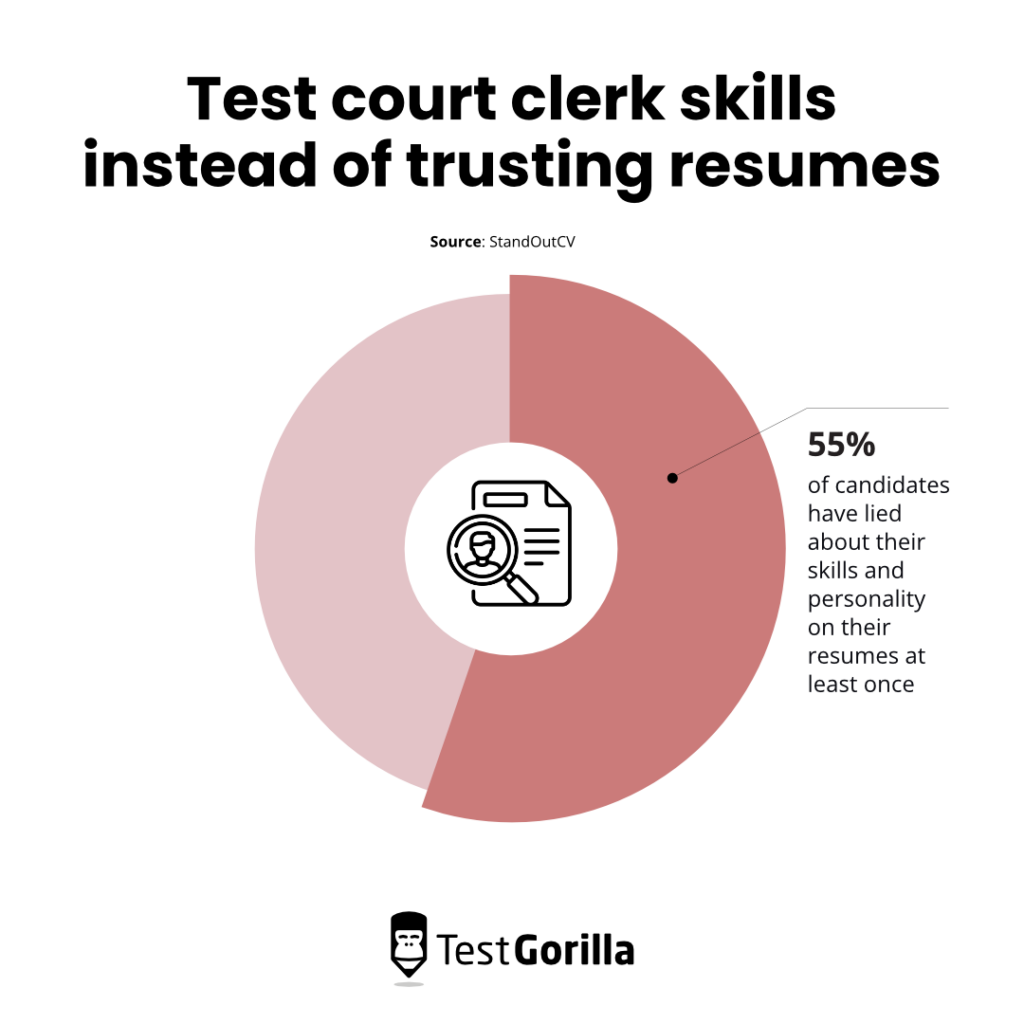Beyond judges, lawyers, and witnesses, the court’s administration involves the action of personnel called clerks. These people act as the backbone of the court and ensure its activities run smoothly and efficiently.
Court clerks are fundamentally administrators, thus they require a lot of skills to coordinate the court’s activities effectively. These skills could either be technical, like data entry skills, or soft, like communication skills.
To hire a stellar court clerk, you must look out for their core skills and techniques. These qualities determine how effective the court clerk will be and, thus, are vital during recruitment.
If you’re wondering how to hire a court clerk and which relevant skills you should look out for, you’re in luck! In this article, we will discuss the core skills excellent court clerks possess and how to test them. You will also learn how to write a court clerk job description that can attract top talent.
Table of contents
What is a court clerk?
A court clerk is a professional who performs administrative duties such as record keeping and scheduling in the court. Generally, court clerks handle the processes that keep the court running effectively.
Some of the major responsibilities of a court clerk include keeping minutes of court sessions, filing documents, and drafting agendas. During court proceedings, they also provide information to the witnesses and are authorized to conduct the swearing of oaths.
Basically, court clerks record all the actions occurring in a court. They maintain trial dockets, case files, and journals about past proceedings. They also function to process and record payments to the court.
Typically, court clerks must have a high school diploma to work in a courtroom. However, higher courts might require a bachelor’s degree in a related field and some working experience.
Court clerks spend around 40 hours weekly at work, although this estimate might be more or less depending on the court’s working hours.
The role of a court clerk is mostly technical since they work with court administration. Hence, they need technical skills such as data entry, bookkeeping, and knowledge of accounting.
Aside from technical skills, they require good communication, writing, attention-to-detail, and time-management skills. These skills enable them to keep accurate records and perform administrative tasks appropriately.
Court clerk hard skills
For court clerks to efficiently manage administrative tasks, they need hard skills like data entry and legal research skills. These skills are specific teachable abilities that are necessary to perform the technical tasks of a court clerk.
During court clerk recruitment, it is vital to consider the hard skills your candidates possess because they help you identify skilled court clerks easily. The following are some court clerk hard skills you should look out for in your candidates:
1. Data entry
Data entry is one of the vital basic skills a court clerk must possess. This skill enables court clerks to manage court records and documents, ensuring they record information accurately.
Primarily, court clerks need data entry skills to manage case files and other court documents containing numerous pages. With these skills, they can locate and retrieve information when necessary and enter it in the correct documents.
In addition, court clerks require good data entry skills to enter information into a database on a computer or physical document. This information could be court orders, motions, judgments, or witness records.
2. Computer literacy
Although court clerks handle various physical documents, they also often need to enter data into online documents and require computer literacy skills to do so.
Data related to court proceedings are vast, so the court stores them on computer systems to prevent data loss or mix-ups. Since the court clerk works with these data, they must be able to navigate computer systems and retrieve information when needed.
Additionally, court clerks need computer literacy to effectively conduct the legal research that assists judges and attorneys in preparing for cases. With computer literacy skills, court clerks can research legal databases and software, finding laws and statutes relevant to a particular case.
3. Writing
The job of a court clerk requires a significant amount of written communication. From writing agendas to drafting minutes of court meetings, court clerks need writing skills to function at their best.
Court clerks also function to write court orders, motions, and pleadings, all of which must be concise and accurate. And they can only achieve this with good writing skills.
Workplace writing skills enable court clerks to draft emails, letters, and memos, which they need to communicate with other court staff. These skills are also necessary for accurate data entry and record keeping.
For example, during a court proceeding, the court clerk needs writing skills to record the minutes of the proceeding. They’ll note orders, verdicts, and motions, ensuring that there aren’t any errors in the records.
4. Knowledge of accounting
Financial management is one of the critical roles of a court clerk. The role involves processing court payments and recording them accordingly. The court clerk can only perform these functions if they have adequate accounting knowledge.
Court clerks with a firm grasp of accounting concepts have an understanding of principles such as credits, debits, and ledger accounts. They can also draw profit and loss accounts to keep records of court transactions.
5. Numerical reasoning
Part of the duties of a court clerk involves managing numerical data related to court cases and financial transactions. They may need to analyze financial reports, calculate fines, or track case statistics.
These duties require adequate numerical reasoning skills. For instance, court clerks with numerical literacy can work with numbers and perform simple calculations like addition, subtraction, and multiplication.
Court clerks may be responsible for managing complex financial transactions and records, such as payroll and tax filings. To effectively manage these transactions, they need to be able to assess financial data, identify errors, and reconcile accounts.
6. Legal research
Court clerks assist judges and lawyers in preparing legal documents, which are critical to making decisions about court cases. Hence, they need legal research skills to find information relevant to a case and ensure that the court staff makes informed decisions.
With legal research skills, the court clerk can find and analyze legal information from various sources. They also need legal research skills to understand multiple topics, including case law, statutes, and regulations.
Essentially, court clerks with adequate legal research skills can quickly and accurately locate and analyze relevant legal information. They can also use this information to ensure the court administration runs smoothly.
Court clerk soft skills
Court clerk soft skills are traits associated with personality that enable court clerks to carry out their functions effectively. Just like hard skills, it’s vital to keep an eye out for these skills. Here are some soft skills to consider during court clerk recruitment:
1. Communication
Court clerks need communication skills to interact with judges, lawyers, and other court staff. To effectively pass information to others, they must be able to speak professionally and courteously with them.
Workplace communication is essential for court clerks because they might need to speak to other court staff regarding courtroom procedures. For example, court clerks should communicate with the staff if they notice a mistake in a court procedure.
In the course of a court clerk’s work, they might also come across people who aren’t court staff. If such people have questions regarding the court’s operations, they should be able to answer them properly while maintaining professionalism.
2. Time management
The work schedule of a court clerk can get hectic, especially on hearing days. On days as such, there may be limited time to accomplish various tasks. Regardless, excellent court clerks must be able to manage their time to finish their work efficiently.
Court clerks need time-management skills to achieve their goals without risking pile-ups of work or inefficiency. With time-management skills, court clerks can order their tasks according to their priority levels and attend to each in time.
3. Collaboration
The role of a court clerk is closely related to other roles, such as judges, lawyers, and other court staff. Hence, they need collaboration skills to work with the other staff to achieve a common goal.
As part of their responsibilities, the court clerk may need to collaborate with other staff to draft schedules, analyze reports, and prepare documents. While interacting with these personnel, they’ll need to be skilled at listening to their colleagues’ ideas and expressing their own.
4. Attention to detail
Court clerks are responsible for ensuring that all legal documents are accurate, complete, and filed correctly. In order to perform this function appropriately, they need to pay attention to every detail.
Attention to detail ensures that the court clerk carries out their tasks without errors. This means they should be able to spot inadequacies in records or financial transactions and correct them accordingly.
Court clerks with adequate attention to detail uphold the court’s integrity while ensuring that court processes meet standards.
5. Organization
The job of a court clerk involves handling numerous vital documents. Without organization skills, the court clerk could mix up these documents or input the wrong data into the court’s database.
Organized court clerks have arranged workspaces and can easily sort out documents as they are required. They spend less time searching for files that contain vital information and can plan court schedules in an organized manner.
How to test court clerk skills
Identifying candidates with top court clerk skills can be a hassle, especially if you’re trusting resumes. StandOutCV records that around 55% of candidates have lied about their skills and personality on their resumes at least once.
Relying on what a resume claims is tricky because there often isn’t enough proof of the skills it lists. Fortunately, there are more reliable methods of screening your candidates. One of these techniques is pre-employment testing.
Pre-employment testing is a skills-based hiring technique that measures your candidates’ skills rather than experience. These tests are computerized assessments that help you find the right person for a job by screening multiple candidates simultaneously.
Although pre-employment testing generally makes recruitment much easier, finding the right platform is vital too. The pre-employment platform you choose must be easy to navigate and effective for testing court clerk skills.
TestGorilla is one of such effective pre-employment platforms that takes all your recruitment needs into consideration. With our bias-free tests, you can measure how skilled your candidates are and easily determine the best fit for the job.
Our test library contains a vast selection of tests suited to specific skills and techniques. Below are a few of our tests which are perfect for gauging court clerk skills:
1. Communication skills test
Our Communication skills test assesses how well candidates can understand information and pass it along to others. It checks for listening, speaking, writing, and reading skills, which are vital for effective communication.
With this test, you can identify and hire court clerks who can communicate comfortably and professionally with others. It will assess the candidates’ ability to listen and resolve issues through good communication.
2. Accounting skills test
TestGorilla’s Accounting skills test checks candidates’ ability to keep records of transactions, prepare statements, and interpret financial information. Essentially, this test helps you find court clerks with intermediate knowledge of accounting principles.
Candidates who pass this test understand credits and debits, profits and losses, and can draft financial records accordingly. They can analyze financial data and draw information that is helpful to the court’s decision-making process.
3. Numerical Reasoning test
Our Numerical Reasoning test evaluates candidates’ ability to draw information from numbers and apply it to their daily operations. With this test, you can find court clerks who can identify number patterns, interpret charts, and understand tables.
This test also checks for an understanding of basic mathematical operations like addition, subtraction, and multiplication.
Those who perform well on this test can apply their numerical reasoning to court clerk functions like budgeting and spreadsheet development.
4. Time Management test
A time management test assesses how well the candidates can maximize time and attend to tasks in a professional environment. The test checks the candidates’ ability to prioritize assignments and complete each one in little time while delivering efficiency.
Using realistic scenarios, our Time Management test assesses how well candidates can plan their schedules to execute tasks within a specified period. Those who pass this test can meet deadlines and multitask while ensuring appropriate completion of each task.
5. Attention to Detail test
The Attention to Detail test from TestGorilla examines the candidates’ ability to screen visual information carefully. This test checks if they can locate errors in a document and correct them accordingly.
With this test, you can find and recruit court clerks who are thorough with their work and ensure clarity, consistency, and accuracy. These clerks can locate visual patterns and study information to spot and correct mistakes.
Where to find a court clerk
One major step in recruitment is selecting the right platform to post your job description. This step is critical because sending your job description to the wrong audience could attract underqualified candidates.
Selecting the right platform to post your job openings goes a long way in determining the quality of your applications. Excellent job posting platforms take your job post to candidates who meet your standards, thus reducing the risk of mis-hiring.
Platforms such as Workable, indeed, and ZipRecruiter are perfect for finding qualified court clerks. However, before choosing one of these platforms, you should find the one that suits your requirements and aligns with your budget.
Workable plans start from $129 for occasional hiring to $599 monthly with a 20% discount. The plans include various features suited for the number of applicants you want to reach and how often you post.
Job posting on Indeed is free. Still, you have to pay to sponsor the posts. Sponsored job posts typically reach a wider audience and thus have the ability to attract more talent to your job description.
On ZipRecruiter, the plans start from $299 per month. However, the plans come with numerous features. Based on your plan, the platform could distribute your post to several sites and boost them with powerful AI.
Court clerk job description template
To understand how to hire a court clerk successfully, you must first know how to draft a job description. The job description is vital to your recruitment as it is one of the first things candidates see.
How well you draft your job description ultimately determines if qualified candidates apply for the position or not. As such, it’s critical to conduct a job analysis first to know what to include and what to exclude in your job description.
If you’ve conducted an analysis and still aren’t sure how to write your job description, we have you covered. We’ve put together a clerk of courts job description template to help you draft the perfect post:
[Job title]
The job title is the main header of the job description that clearly states the role. It should be short and concise so the candidates can know at first glance if they’re right for the job. For your court clerk job description, you could use this title:
Court clerk needed at [COMPANY NAME].
[Company overview]
The company overview is a short section that’s usually 4-5 sentences long and introduces the candidates to your company. Here, you would describe what your company does, including your location and key facts about you.
You could also state your goals, history, and some important people in the company. Here’s an example:
“[COMPANY NAME] is a legal institution located in Oregon. We offer legal services to our clients, ensuring that our operations comply with the law and follow due process. The court was founded in [YEAR FOUNDED], and since then, we’ve maintained its integrity as a team.”
[Job overview]
The job overview section should state the roles of the clerk and how they fit with your company’s goals. It should be precise yet informative so candidates can understand the position and check if they can fill it. For example:
“As [COMPANY NAME]’s court clerk, you will coordinate the administrative activities of the court. You will assist the judge and lawyers of the court with making informed decisions and ensuring order at all times.”
[Duties and responsibilities]
Here, you outline the duties of a court clerk that you expect the candidates to perform. You can include the person they would report to, their working hours, and all the extra demands you want. Below is an example:
As the court clerk, you will be responsible for the court’s administration and financial transactions. Your duties include:
Recording the minutes of court proceedings
Creating calendars of cases
Preparing and distributing court orders, motions, and verdicts
Processing and collecting court fines and maintaining records of transactions
Ensuring legal documents submitted adhere to court procedures
Performing basic bookkeeping tasks
Administering oaths
[Qualifications and skills]
In this section, you will state the qualifications, skills, and experience level you’re looking for. Note that most court clerks only need a high school diploma and some experience. However, if you’re hiring them into a high court, they might need a degree in a related field.
Here’s an instance:
Eligible candidates will have these qualifications and skills:
A high school diploma
Proven work experience as a court clerk or similar role
Excellent organizational and multitasking abilities
Intermediate-level computer literacy
Stellar communication and interpersonal skills
Relevant training and certifications as a court clerk.
[Company benefits]
This section is where you list your company’s offers to urge the candidates to apply. You could include opportunities you offer, the court clerk’s salary, insurance, and other incentives. Here is an example of how to write your company benefits section:
As a court teller in [ORGANIZATION NAME], you will have access to the following:
Medical and dental insurance.
Retirement benefits.
Paid time off.
Hourly pay of $18.
How much does a court clerk cost?
The cost of hiring a court clerk depends on various factors, including the experience level and the job’s complexity. So, it is always a good idea to consider these factors when planning your recruitment budget.
Glassdoor reports that it costs around $4,000 to recruit a new employee. However, this cost could vary according to their skills and expertise. For example, court clerks with five years of experience cost more than beginners, so you will spend more when hiring them.
After considering the general costs of hiring, you must also determine how much to pay your new court clerk. Their salary determines how expensive hiring a new court clerk would be.
According to ZipRecruiter, court clerks earn an average of $54,531 annually. However, this cost isn’t fixed. Depending on how experienced your court clerk is, you might pay more or less.
Court clerk interview questions
Conducting an interview is an intricate process that constitutes a major part of recruitment. Interviews provide a chance for the recruiter to see how the candidates carry themselves. This means the recruiter observes how they act, speak, and react to situations.
In-person interviews can last between minutes and hours, depending on the number and complexity of questions asked. However, you can shorten this time by administering a test to the candidates before the interviews.
Incorporating tests before the interviews lets you have some information about the candidates’ personalities and skills. This also double-checks their abilities and verifies whether they are authentic.
During the interviews, you have stipulated time to analyze the candidates’ skills, personalities, and experiences. So, it is advisable to draft your interview questions beforehand to prevent disruptions during the process.
Your interview plan serves as the blueprint for the process. This plan specifies the time for each session and the questions to ask the candidates.
Planning your interview questions improves the interview’s effectiveness since you won’t be tasked with thinking of questions on the spot. Below are some court clerk interview questions you can ask during an interview to find the best fit for the job:
How would you prioritize tasks when you have various assignments due?
What has been the most complex challenge of being a court clerk, and how did you tackle it?
Describe your experience as a court clerk.
How do you ensure that all court records are up to date?
How would you rate your attention to detail?
What steps do you take to maintain order in the court?
Describe how you conduct legal research.
What do you think the daily routine of a court clerk involves?
Aside from these, you can include time management and communication interview questions to help you find the right fit.
Hire your next court clerk the smart way
Pre-employment skills testing is growing increasingly popular in the hiring world, and for good reason. These tests provide a quick, easy, and efficient way to check if a candidate fits the position of a court clerk.
TestGorilla is a pre-employment testing platform that gives you access to numerous pre-employment tests suited for testing various skills. Our assessments help you remove hiring bias and offer the chance to see your candidates put their skills to the test.
After each test, our platform ranks each candidate so you can immediately identify the most suitable applicant for the role. Sign up for free with us today to get started!
Related posts
Hire the best candidates with TestGorilla
Create pre-employment assessments in minutes to screen candidates, save time, and hire the best talent.
Latest posts
The best advice in pre-employment testing, in your inbox.
No spam. Unsubscribe at any time.

Hire the best. No bias. No stress.
Our screening tests identify the best candidates and make your hiring decisions faster, easier, and bias-free.
Free resources
This checklist covers key features you should look for when choosing a skills testing platform
This resource will help you develop an onboarding checklist for new hires.
How to assess your candidates' attention to detail.
Learn how to get human resources certified through HRCI or SHRM.
Learn how you can improve the level of talent at your company.
Learn how CapitalT reduced hiring bias with online skills assessments.
Learn how to make the resume process more efficient and more effective.
Improve your hiring strategy with these 7 critical recruitment metrics.
Learn how Sukhi decreased time spent reviewing resumes by 83%!
Hire more efficiently with these hacks that 99% of recruiters aren't using.
Make a business case for diversity and inclusion initiatives with this data.




















